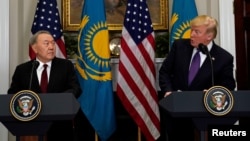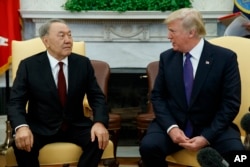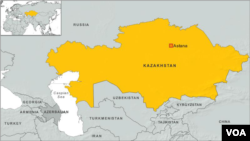Kazakhstan President Nursultan Nazarbayev, on a visit to Washington, has offered the United States enhanced strategic cooperation on some of the most vexing geopolitical issues, as well as stronger economic ties.
In meetings with U.S. President Donald Trump at the White House Tuesday, Nazarbayev suggested his strategically located former Soviet republic could be a valuable ally on issues from ranging from Afghanistan to Russia to the nuclear ambitions of Iran and North Korea.
"You probably know that Kazakhstan was a country that possessed the fourth largest nuclear arsenal in the world, but then we voluntarily decided to give up nuclear weapons,” Nazarbayev said during a joint appearance with Trump. “Kazakhstan has the moral right to talk to the nations that are seeking nuclear weapons. And this is the way we are talking to Iran and this is the way we will be talking to North Korea."
Calling Kazakhstan a “valued partner in our efforts to rid the Korean peninsula of nuclear weapons,” Trump said he and Nazarbayev were determined to prevent the Pyongyang regime from “threatening the world with nuclear devastation.”
During the visit, Nazarbayev also announced business deals with U.S. companies worth $7.5 billion, including contracts to purchase Boeing aircraft and to assemble 900 General Electric locomotives in Kazakhstan.
Nazarbayev’s visit comes as Kazakhstan holds the rotating presidency of the United Nations Security Council. Kazakhstan is the first Central Asian country to be elected to a two-year term on the Security Council, and Nazarbayev will visit the United Nations during his U.S. tour.
Strategic location
David A. Merkel, a senior fellow with the Atlantic Council and former deputy assistant secretary of state and director of the National Security Council in the George W. Bush administration, says Kazakhstan’s strategic position in the same neighborhood as Russia, China, Afghanistan, Pakistan and Iran gives Nazarbayev and Trump a lot to talk about.
“This is a time of opportunity for the reintegration of Afghanistan into the neighborhood, for which Kazakhstan as the leader of the Central Asian neighborhood is important,” Merkel said. “Our complicated relationship with Pakistan would have the administration focusing on other countries in the region and working with other countries to try to have a better working relationship among them.”
In a VOA interview, Merkel explained that in the 26 years since independence, Kazakhstan has grown into the most strategically and economically important of the five former Soviet Central Asian republics,
“Kazakhstan has enjoyed the greatest stability of any of the five,” he said. “It has the advantage of hydrocarbon wealth, which it has invested well. It has focused a lot of attention on educating its youth and is now looking toward focusing more attention on diversifying the economy.”
Nazarbayev has ruled Kazakhstan since before it was an independent country, and his authoritarian leadership style has changed little since the days when the country was part of the Soviet Union. He won the last presidential election in 2015 with nearly 98 percent of the vote.
Human rights groups and the U.S. State Department have been sharply critical of the country’s rights record.
A recent Human Rights Watch assessment is that Kazakhstan "heavily restricts freedom of assembly, speech, and religion, and torture remains a serious problem,” while Amnesty International says “authorities use ... criminal prosecution to target social media users and independent journalists."
Merkel acknowledges Nazarbayev’s flawed leadership, but says Kazakhstan is among countries in the region that have shown the greatest movement toward democracy.
“Nazarbayev has legitimacy in the country,” Merkel said. “Decisions that are made in Kazakhstan are made with an eye toward what is possible in the neighborhood, and it’s important for us to recognize the strategic value of his leadership, the strategic value of the country.”
Trump and Nazarbayev first met in Saudi Arabia last May, on the sidelines of the Arab Islamic summit. They spoke by telephone in October, at which time the Kazakh side reported that Trump had invited Nazarbayev to the White House.
The United States was the first country to recognize Kazakhstan’s independence after the Soviet Union fell in 1991.






